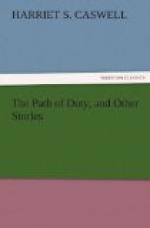much good sense to be utterly cast down for the wrong-doing
of another. Whatever were Arthur’s feelings
after he had taken this step, he spoke of them to
no one. I never again mentioned the subject to
him, but, knowing him as I did, I could see that he
was far from being satisfied with his own conduct,
and he departed for the city some weeks sooner than
he had at first intended. Owing to the friendly
feeling I had ever cherished for him, I could not help
a feeling of anxiety after his departure, for I feared
that all was not right with him. He did not entirely
cease from writing to me; but his letters were not
frequent, and they were very brief and formal—very
unlike the former brotherly communications which used
to pass between us. A year passed away.
I obtained a situation nearly a hundred miles from
home. I had heard nothing from Arthur for a long
time, and, amid my own cares, he recurred to my mind
with less frequency than formerly; yet often after
the business of the day was over, and my mind was at
leisure, memory would recall Arthur Sinclair to my
mind with a pained sort of interest. About six
months after I left home I was surprised by receiving
from Mr. Sinclair a hastily written letter, requesting
me, if possible, to lose no time in hastening to Littleton,
stating also that he was obliged to take a journey
to Boston on business which vitally concerned Arthur,
and he wished me to accompany him. He closed by
requesting me to mention the letter I had received
from him to no one, saying that he knew me and my
regard for Arthur sufficiently well to trust me in
the matter. My fears were instantly alive for
Arthur, and I feared that some misfortune to him was
hidden behind this veil of secrecy: and I soon
found that my fears were well founded. I set out
at once for Littleton, and upon arriving there I proceeded
directly to the residence of Mr. Sinclair. When
he met me at the door I was struck by the change in
his countenance; he appeared as if ten years had been
added to his age since I last saw him, six months ago.
He waited not for me to make any inquiries, but, motioning
me into a private apartment, he closed the door, and
seating himself by my side, said in a hoarse voice:
“I may as well tell you the worst at once:
my son, and also your once dear friend, Arthur, is
a thief, and, but for the lenity and consideration
of his employer, before this time would have been lodged
within the walls of a prison.” I made no
reply, but gazed upon him in silent astonishment and
horror. When he became more composed, he informed
me that he had lately received a letter from Mr. Worthing
(Arthur’s employer) informing him that he had
detected Arthur in the crime of stealing money from
the safe, to quite a large amount. In giving
the particulars of the unfortunate circumstance, he
further stated, for some time past he had missed different
sums of money, but was unable to attach suspicion
to any one; “and, although,” said he, “I
have been for some time fearful that your son was associating




